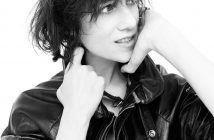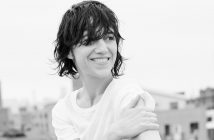Interview by Bethan Cole, Saturday, 9 July 2011
The daughter of Anglo-French musical royalty, Charlotte Gainsbourg was destined to be a performer – and now she’s in the hottest arthouse film of the year. So what does the actress and singer have to be shy about?
Gainsbourg says:
‘I’d love to try Hollywood but I’m not seen that way’
In Paris, the sun is shining and everything is gleaming and bright. Inside a palatial biscuit-and-cream-coloured suite at the Hotel Royal Monceau, Charlotte Gainsbourg is sitting curled into herself on a vast button-back sofa, all elongated limbs and eye-grazing fringe.
According to her agent, Gainsbourg is five months’ pregnant with her third child (the baby is due in July). And yet, as I scan her personage, there is no trace at all of a bump. Her black-and-red Balenciaga sweater is baggy on her, and she wears tighter-than-tight black jeans.
She may have the body of a model, but she is also rather shy, even recoiling from eye contact. Is this really the child of two celebrities? Charlotte is the daughter of French bohemian royalty: Serge Gainsbourg, the louche, dissolute singer-songwriter and Jane Birkin, his fashion-plate English muse (and a woman who gave her name to an Hermès handbag). She is, in a sense, the result of Serge’s most famous song, « Je T’aime… Moi Non Plus », the breathy duet with Birkin released in 1969.
Charlotte’s half sisters are the photographer Kate Barry (whose father is the composer John Barry) and the model and actress Lou Doillon (whose father is film director Jacques Doillon). Lou, who shares Charlotte’s dark good looks, is currently gracing the cover of the La Redoute catalogue.
In Gainsbourg, last year’s biopic of her father, Charlotte’s early years were portrayed as being marred by her father’s prodigious drinking and her parents’ turbulent relationship. She grew up in Paris with her mother and attended École Active Bilingue Jeannine Manuel. In 1984, she released her first musical endeavour, « Lemon Incest », a controversial record made with her father. She also made her film debut in 1984, playing Catherine Deneuve’s daughter in Paroles Et Musique.
You might imagine a celebrity offspring to turn out more gregarious, bumptious, brattish even (think of Kelly Osbourne and Peaches Geldof) than the quiet, retiring, reticent creature sitting before me today. Surely the legacy of such stellar parents would endow a child with infinite confidence, especially by the age of 40?
It’s not as if Gainsbourg hasn’t won accolades of her own. An accomplished actress and singer, she has appeared in nearly 40 films to date and won a Best Actress accolade at Cannes (in 2009, for Lars von Trier’s Antichrist in which she played Willem Dafoe’s wife who is tortured by the death of her child). She has released three albums, one of which shot to number one in France.
There are moments in our encounter when she does, in that cut-glass, English-rose voice of hers, intimate that there might be a far less ambiguous soul beneath the introversion. She has just finished acting alongside Pete Doherty in an adaptation of Alfred de Musset’s autobiographical novel, La Confession d’un Enfant du Siècle, which details De Musset’s affair with the writer Georges Sand, but she will not be drawn on Doherty at all. In fact she seems ruffled at the mention of his name. « Oh, I considered him as an actor, I didn’t look at him as a rock star. It was a great experience, » is all she’ll say. She admits to not even being sure if he knew her music.
In another forthcoming film, The Tree, based on the Australian novel Our Father Who Art in a Tree by Judy Pascoe, she plays Dawn, who is left to bring up four children when her husband crashes his car into a tree in their garden. She also stars with Kirsten Dunst, Kiefer Sutherland, Charlotte Rampling and John Hurt in Lars von Trier’s latest, Melancholia, which she says was « less intense than Antichrist. »
Gainsbourg has become one of arthouse cinema’s favourite ingénues, although now as a mother of three children she is perhaps a little old to play that part; she has two children already with the French Israeli actor and director Yvan Attal, whom she has been with for almost 20 years. But roles such as Stéphanie in The Science of Sleep and Lucy in Golden Door, both in 2006, not to mention her appearances in I’m Not There and 21 Grams, have made her the Anglo-French queen of the indie cinema circuit. In all that time, she claims, Hollywood never came calling.
« There’s been no conscious decision to avoid it, » she says. « I do have an agent in America, but it’s always the case that I’m offered independent films, not Hollywood films. I’d love to try it – it must be an experience to be in a big Hollywood film. Why not? But I know that people don’t see me that way. »
Does she think people would be disappointed if she did some cheesy rom-com? Not really, she says: « It’s fun to try things, and not to go where people expect you – I find that quite exciting. » Hollywood producers take note.
As far as her singing is concerned, Gainsbourg’s voice is incredibly pure and her English enunciation perfect: she has a gift for making lyrics sound as though they are being spoken intimately to each and every listener. Her second album, 5:55, shot to number one in the French charts and both 5:55 and her most recent release, IRM, have earnt her critical acclaim. A fourth album, Live and Unreleased, with new tracks by Beck, is due in September and a single, « Memoir », composed by Conor O’Brien (of Villagers) was released this spring.
She admits that she doesn’t write lyrics: « I collaborated with Beck, giving him one word or a title or an idea, but never a whole song. He did everything, really. I was able to be there to have the impression we were collaborating. » That’s not to say her work lacks autobiographical material. Gainsbourg came perilously close to losing her life in 2007, after a water-skiing accident triggered a haemorrhage. She underwent a series of MRI scans – an experience that provided the theme and title to her album IRM (that being the French acronym for an MRI).
The reason we’re here is an altogether more pleasant one. Regularly cited as one of the world’s best-dressed women, Gainsbourg is also an in-house muse to one of fashion’s most respected designers, Nicolas Ghesquière of Balenciaga. Last year, Charlotte became the face of the house’s debut fragrance, Balenciaga Paris, and now she’s promoting Ghesquière’s second olfactory offering, L’Essence. A leather chypre that mellows into something soft and sensual, it is evocative of the smell of vintage make-up.
« When I smelt it, I felt it was really what I was hoping for, » she says. « L’Essence is, I find, closer to ‘me’ in that it’s more daring and there’s something a bit more obscure, also, that I like. » It’s an artist/muse relationship that seems to suit her well. For his part, Ghesquière is unrestrained in his praise, telling me later that Charlotte has « remained pure, despite the publicity machine around her. She has a certain innocence about her ».
In the most superficial sense, she certainly looks pure: on the day we meet, there is only the faintest trace of natural-looking make-up on her face. I try to discern if she’s had any work done, a little shot of Botox perhaps, but, although her forehead is covered by her trademark fringe, I think not.
« I haven’t used them yet, but maybe I will, » she says, pondering the idea of fillers and surgical intervention. « I always thought I’d never touch my face and that you have to grow old and you have to have wrinkles. I can’t stand those faces with puffed-up lips, but you never know how you cope with ageing.
« I wanted to re-do my nose as an adolescent but thank God my father said, ‘Keep your personality, your personality is in your nose’, so I didn’t do it. Everything tends to show you that you shouldn’t touch your face, but I don’t know… it’s difficult being an actress because the camera magnifies absolutely everything. »
She tells me she is rigorous about skincare – she recently discovered Crème de la Mer and uses a touch of make-up daily to cover up spots, but overall, she’s not very interested in beauty regimens. Her hair is a natural colour (« although I would dye it if it went grey, which is a bit like Botox in a way »), and she cuts her fringe herself. « I don’t take the time to do massages or go to spas, for example, and my feet are terrible, » she says.
And when she’s off duty, Gainsbourg admits, she isn’t too bothered about fashion, either. « I’m always wearing the same things: jeans and an old pair of boots. I like to find myself again after wearing the costumes of a film so it’s going back to what I’m used to. I don’t like making too much effort. » For her musical performances and the red carpet, she is dressed by Ghesquière who, she says, helps her to be more adventurous with her choice of clothes.
Otherwise, she says, she is uninterested. « I’m not very classical, » she admits, « it doesn’t suit me. I’m not really part of the fashion world and I like keeping a distance. » As if to prove a point, at Cannes this year she was dressed down with mussed-up hair – appearing one day in a very casual black shirt-dress and the next with a see-through gown which displayed her pregnancy bump.
Gainsbourg is a contrarian if nothing else: I had imagined she would be vehemently anti-plastic surgery and anti-Hollywood, but she seems to enjoy confounding expectation, betraying a wilfulness you might not expect in one initially so shy.
Her enunciation is crisp, and not in the slightest bit French as you might expect. Instead of the ‘zees’ and ‘zises’ of her father, she uses upright consonants and vowels that are pure Queen’s English. It’s only her word order that sounds European. A typical utterance might be something like this, where she discusses the look which Ghesquière has developed for her: « A little bit, it’s daring, and it’s, um, it does look like me but I have the impression I’m going his way, a little bit, which I like ».
Gainsbourg’s face has the irregular beauty you’d expect from an arthouse heroine, but her voice is classic – as timelessly British as a green summer lawn. She must have her mother, Jane Birkin, to thank for that.
But you get the feeling that Gainsbourg is more than the sum of her genetic parts. She admits, though, that she wouldn’t be able to choose, if pressured, between acting and music – both have a place close to her heart.
« I don’t want to have to choose! » she exclaims. « I’ve been doing films for longer and I have more experience doing that, but at the same time the music has this freshness for me of discovering things.
« The only thing I can say – and it describes me not wanting to sacrifice anything – is that when I do music, I miss films, and when I do films, I miss music. I hope I’ll be able to continue both. »
L’Essence by Balenciaga is available from Harvey Nichols




